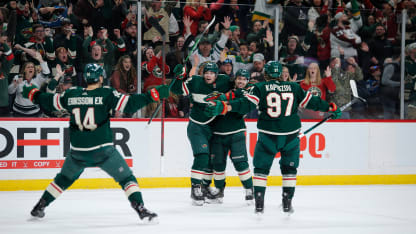As the Wild embarks on its first road trip in several weeks, it will do so looking very different than the team that lost 3-2 in a shootout in Columbus on March 11, the last time the Wild played a road game.
Forwards Tyson Jost and Nicolas Deslauriers, defenseman Jake Middleton and goaltender Marc-Andre Fleury know nothing other than the team's Forest Green home sweaters, and all three have integrated themselves into the lineup.
None have experienced a regulation loss in a Wild sweater either.
"After the deadline, also, now we're set and the new guys feel like we're a big family," said Wild forward Kevin Fiala. "They came in and didn't take long to get into it and feel comfortable with us, and that's awesome. It's been awesome to involve everybody, and I think it's worked out very well."
It's a streak Minnesota will try and keep going as long as it can. And while occasional regulation defeats will undoubtedly come at some point, perhaps the most important thing this homestand has brought has been the Wild's re-commitment to the game and the style of play that has brought so much success.
Now it'll be about sustaining that play and ramping up as the "dog days" quickly become the "stretch run" into the postseason, which begins the first week of May.
"We've played some good hockey but it has to be a consistent thing. We have to repeat each and every game," said Wild coach Dean Evason. "The way that we're playing structurally, playing patient and playing good, hard defensive hockey, not cheating and allowing when the offense is there to take it. We're not trying to crate offense, we're playing the right way. We want to continue to do that as we go forward."
Fending off the Blues and Predators remains the Wild's most realistic short-term priority.
Finishing second in the Central means home-ice advantage in a First Round series (likely) against either of those clubs, and that's something the Wild desperately wants to achieve.
"It's no secret, we play great here," Goligoski said. "Especially playoff time, home-ice is important and that's what we're trying to do here."

















